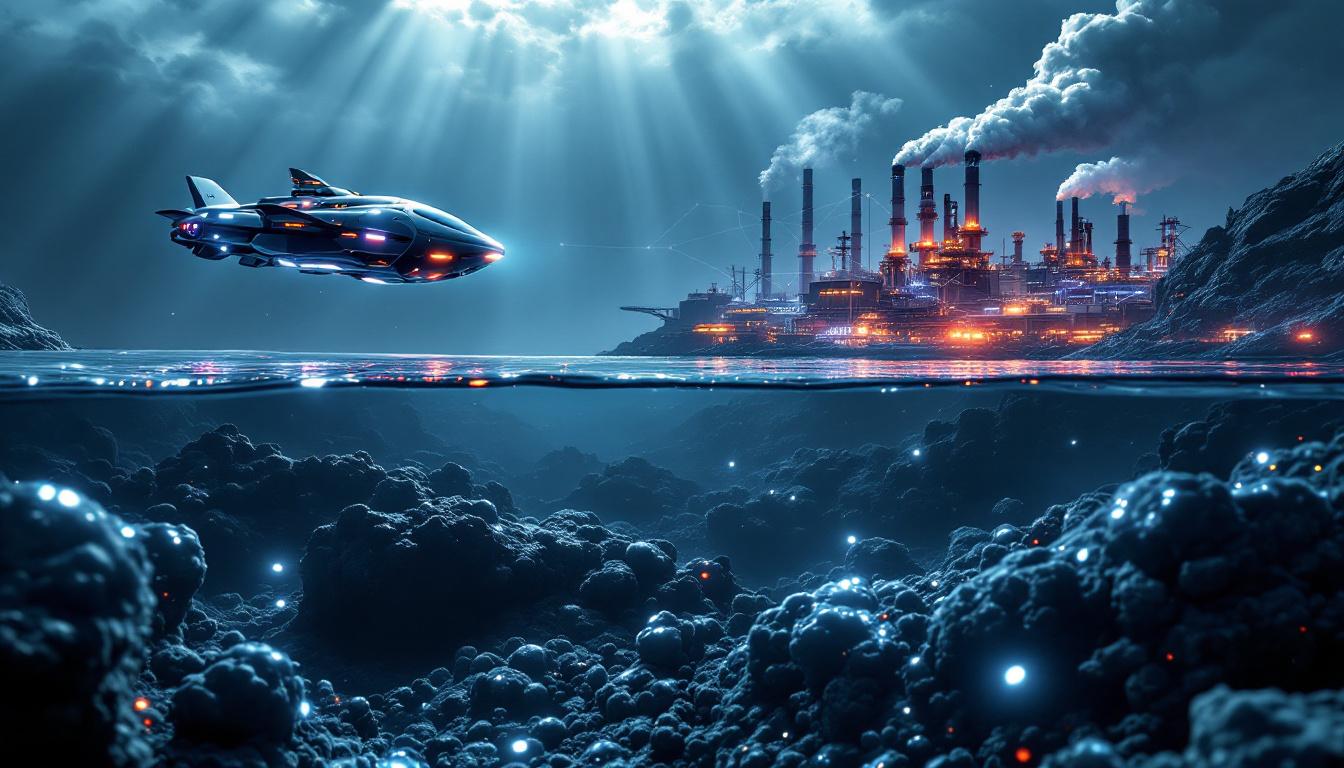Understanding Niger's Uranium Nationalization: Implications and Motives
In a significant shift for West African resource control, Niger announced the nationalization of the Somair uranium joint venture on June 19, 2025. This decision, broadcast on national television, represents a pivotal moment in Niger's approach to natural resource management and marks a dramatic evolution in its relationship with France, the home country of Orano, which previously held the majority stake in the operation.
The nationalization comes amid deteriorating relations between Niger and its former colonial power, with the Niger government explicitly citing expired mining agreements and allegations of corporate misconduct as justification for taking full control of this strategically important resource.
What is Happening with Niger's Uranium Nationalization?
The military-led government of Niger has formally announced its intention to nationalize the Somair uranium joint venture, previously operated by French nuclear company Orano. This operation, located in the uranium-rich Arlit region of northern Niger, has been a cornerstone of Niger's mining sector for decades.
According to Reuters, as reported by Mining Technology, the government announcement specifically referenced the "irresponsible, illegal, and unfair behavior" of Orano as a primary motivation for the takeover. The nationalization effectively transfers the 63% ownership stake previously held by Orano to Niger's state-owned mining company, Sopamin, which already controlled the remaining 37%.
"Faced with this irresponsible, illegal, and unfair behaviour by Orano… the government of Niger has decided, in full sovereignty, to nationalise Somair," the government statement declared during the national broadcast.
The move represents one of the most significant resource nationalizations in West Africa in recent years and signals a profound realignment of Niger's approach to managing its natural resource wealth following the political transition that began in July 2023.
Legal Basis for the Nationalization
The Niger government has positioned the nationalization within a legal framework, specifically citing the expiration of mining agreements with Orano in December 2023 as providing the legal basis for this action. This timing is significant, as it means the agreements expired approximately five months after the military coup that dramatically altered Niger's political landscape.
Geopolitical Context
The nationalization cannot be understood outside the context of broader France-Niger relations. Since the July 2023 coup led by General Abdourahamane Tiani, relations between the two countries have deteriorated significantly, with France withdrawing its troops and diplomatic mission from the country in late 2023.
Why is Niger Nationalizing Uranium Operations?
Political Tensions with France
The Niger and Orano uranium nationalisation represents the latest development in a series of escalating tensions between Niger and France. In its official announcement, the Niger government explicitly characterized France as having been "openly hostile toward Niger since 26 July 2023," directly linking the resource takeover to diplomatic frictions.
This hostility reference connects to France's condemnation of the military coup and subsequent withdrawal of support and recognition for the military government. The nationalization thus appears partly motivated by geopolitical considerations and the military government's desire to assert independence from former colonial influence.
Expired Mining Agreements
A key technical justification cited by the Niger government is the December 2023 expiration of mining agreements that had previously governed Orano's operations. The government has strategically used this contractual endpoint as legal grounds to assert control over uranium resources without triggering compensation mechanisms that might apply in cases of premature contract termination.
This timing allowed the military government several months to consolidate power before making this move, suggesting a calculated approach to resource nationalization rather than an impulsive decision.
Resource Sovereignty Aspirations
The nationalization aligns with a broader philosophy of resource nationalism that has gained traction across several West African nations in recent years. By taking control of Somair, Niger's military government is positioning itself as the defender of national interests against perceived exploitation by foreign corporations.
The emphasis on "full sovereignty" in the government's announcement reveals the ideological underpinnings of this decision: a belief that Niger's natural resources should directly benefit Niger's people and development goals rather than primarily serving foreign interests.
How Will This Affect Global Uranium Markets?
Niger's Position in Global Uranium Production
Niger ranks as the world's seventh-largest uranium producer, with its mines historically accounting for approximately 5% of worldwide production. The Somair operation, specifically targeted by this nationalization, has been a significant contributor to this output, making its operational future a matter of global market interest.
The country's uranium reserves are estimated to be among the largest in Africa, with high-grade deposits that make them economically attractive for extraction despite logistical challenges inherent to the region.
Supply Chain Disruptions
The nationalization creates immediate uncertainty in uranium supply chains that have long incorporated Niger's production into their planning. European nuclear power producers, particularly those in France, have historically relied on Niger's uranium as a key component of their fuel supply strategies.
While most major nuclear power operators maintain strategic uranium reserves sufficient to weather short-term supply disruptions, prolonged production issues at Somair could eventually create downstream challenges for utilities that have incorporated Niger's output into their fuel procurement plans.
Price Implications for Uranium
Uranium markets have already shown sensitivity to the deteriorating situation in Niger. Spot prices for uranium concentrate (U₃O₈) have demonstrated uranium market volatility in response to the uncertainty surrounding Niger's production outlook.
Market analysts suggest this disruption could contribute to upward price pressure if production levels at Somair cannot be maintained under state management. However, the global uranium market has multiple supply sources capable of increasing output to offset potential shortfalls, potentially limiting long-term price impacts.
What is the Status of Orano's Operations in Niger?
Current Ownership Structure
Prior to the nationalization announcement, Orano held a 63% controlling stake in the Somair joint venture, with Niger's state mining company Sopamin owning the remaining 37%. This ownership distribution gave Orano effective operational control while providing Niger with significant revenue participation.
This arrangement had been in place for decades, reflecting the historical partnership between France and Niger in developing the latter's uranium resources, dating back to the post-colonial period.
Operational Challenges
According to Mining Technology's reporting, Orano has been effectively excluded from Somair's operations since the military government took control of the mine following the coup. This exclusion has created significant operational disruptions, with Orano citing "detrimental impact on the mine's financial health" resulting from this interference.
The practical implications of this operational exclusion likely include challenges in technical maintenance, supply chain management, and access to specialized expertise that Orano previously provided to ensure optimal production levels.
Legal Countermeasures
Orano has not accepted the nationalization passively. The company has pursued multiple legal avenues to contest Niger's actions, including:
- Filing for international arbitration against Niger
- Initiating lawsuits within Niger's domestic legal system
- Challenging what it describes as arbitrary arrests of staff and seizures of company property
These legal actions suggest a protracted dispute that may continue even as Niger attempts to move forward with state management of the operation.
How Has the Dispute Escalated Over Time?
Initial Tensions
The seeds of the current dispute were planted during the July 2023 military coup that removed President Mohamed Bazoum from power. Following this political transition, relations between Niger and France deteriorated rapidly, with France initially refusing to recognize the military government's legitimacy.
As tensions mounted, Niger's military leadership began taking increasingly assertive stances toward French interests in the country, including the strategically important uranium operations.
Staff Detention and Property Seizures
According to Mining Technology, Orano has alleged that its staff have faced "arbitrary arrest, illegal detention and unjust confiscation" involving both personnel and company assets. These allegations suggest a pattern of increasing pressure on the company's operations predating the formal nationalization announcement.
These actions appear to have been part of a systematic campaign to assert control over the Somair operations well before the formal nationalization declaration.
Potential Asset Sale Considerations
By May 2025, the operational environment had deteriorated to the point where Orano publicly acknowledged it was considering selling its uranium assets in Niger. This disclosure came just weeks before the nationalization announcement, suggesting the company had already determined that continued operation under the current political climate was untenable.
This timeline indicates a progressive breakdown in the working relationship between Orano and Niger's authorities, culminating in the nationalization decision.
What Are the Broader Implications for Resource Nationalism?
Regional Resource Control Trends
Niger's move reflects a growing trend across West Africa where military governments have sought greater control over natural resources. Similar resource nationalism has emerged in Mali and Burkina Faso following their own recent political transitions, suggesting a regional pattern rather than an isolated incident.
This trend represents a significant shift from the resource management approaches that dominated the region in previous decades, where foreign companies often maintained operational control of extractive industries under various concessionary agreements.
Foreign Investment Climate
The nationalization sends potent signals to other international mining companies about changing risk profiles in Niger and potentially other countries in the region. Investors will likely reassess the security of their assets in countries experiencing political transitions, potentially demanding higher risk premiums for future investments.
Mining companies operating in the region may accelerate efforts to secure stronger legal protections for their investments or diversify their asset portfolios to reduce exposure to any single country's political risks.
Economic Development Strategies
How Niger manages these uranium assets post-nationalization will be crucial for determining whether resource nationalism translates into sustainable economic benefits. The government faces significant challenges in:
- Maintaining technical expertise previously provided by Orano
- Securing market access for uranium exports
- Managing the financial aspects of the operation without foreign investment
Success or failure in these areas will influence how resource nationalism is perceived both within Niger and by other resource-rich countries considering similar moves.
What Legal Frameworks Apply to the Nationalization?
International Investment Protections
The dispute likely involves bilateral investment treaties (BITs) between Niger and France that provide certain protections for foreign investors against expropriation without fair compensation. These treaties typically establish standards for:
- Fair and equitable treatment of investments
- Protection against arbitrary or discriminatory measures
- Rights to compensation for nationalized assets
Orano's pursuit of international arbitration suggests it believes these protections apply despite Niger's claims regarding expired mining agreements.
Mining Contract Provisions
The expired mining agreements between Orano and Niger likely contain specific provisions regarding:
- Termination conditions and procedures
- Transfer of assets upon contract expiration
- Dispute resolution mechanisms
- Environmental remediation responsibilities
How these provisions are interpreted will significantly influence the legal assessment of Niger's actions and potential compensation requirements.
Arbitration Mechanisms
International arbitration forums, likely including the International Centre for Settlement of Investment Disputes (ICSID), will play a significant role in resolving this dispute. These mechanisms provide neutral venues for addressing complex transnational investment conflicts.
The arbitration process could take years to resolve, creating extended uncertainty for both Niger's uranium sector and Orano's shareholders.
FAQ About Niger's Uranium Nationalization
Will this nationalization affect global nuclear energy production?
While Niger is a significant uranium producer, the global market has multiple supply sources capable of compensating for potential disruptions. Major nuclear energy producers typically maintain strategic reserves sufficient to cover several months to years of fuel requirements.
Kazakhstan, Australia, and Canada collectively account for over 60% of global uranium production and could potentially increase output to address any supply gaps resulting from Niger's nationalization.
What alternatives does France have for uranium supplies?
France has diversified its uranium supply relationships over recent decades. While Niger has been historically important, French nuclear operator EDF and Orano maintain supply agreements with multiple countries including:
- Kazakhstan (the world's largest uranium producer)
- Australia (holding the world's largest uranium reserves)
- Canada (home to some of the highest-grade uranium deposits)
- Namibia uranium halt (an increasingly important African producer)
This diversification provides significant resilience against supply disruptions from any single source.
Could other mining operations in Niger face similar nationalization?
Foreign mining companies operating in Niger, particularly in gold and oil extraction, now face heightened political risk following the uranium precedent. Companies with agreements approaching expiration dates or those perceived as aligned with Western interests may be particularly vulnerable.
Niger's government may also be calculating the different strategic implications of nationalizing various resource operations, potentially prioritizing those with the greatest perceived economic or political value.
What compensation might Orano receive?
International law typically requires "prompt, adequate, and effective compensation" for nationalized assets. However, Niger's government appears to be positioning the takeover as the natural conclusion of expired agreements rather than expropriation, potentially to avoid compensation obligations.
The actual compensation, if any, will likely be determined through lengthy legal proceedings and may be influenced by:
- Valuation methodologies for the asset
- Interpretation of contract expiration terms
- Political negotiations between Niger and France
- Precedents in similar resource nationalization cases
Future Outlook for Niger's Uranium Sector
Management Challenges
Niger's government faces significant technical and operational challenges in maintaining production levels without Orano's expertise. These challenges include:
- Accessing specialized mining equipment and parts
- Maintaining safety and environmental standards
- Managing complex extraction processes
- Securing export markets previously facilitated by Orano
Production disruptions seem likely in the short term while these transition challenges are addressed.
International Partnerships
Niger may seek new international partners to provide technical assistance and investment following the break with Orano. Potential partners could include:
- Chinese nuclear companies (CNNC or CGN), which have shown increasing interest in African uranium assets
- Russian nuclear corporation Rosatom, which has expanded its African presence significantly in recent years
- Regional mining companies looking to expand their uranium portfolios
These new partnerships would likely come with their own political and economic conditions that could reshape Niger's resource development trajectory.
Long-term Production Viability
The success of the nationalization will ultimately be measured by whether Niger can:
- Maintain or increase uranium production levels
- Secure favorable pricing for its uranium exports
- Translate resource control into tangible economic benefits for citizens
- Attract sufficient investment for future mine development and exploration
The answers to these questions will emerge over the coming years and will significantly influence perceptions of resource nationalism's viability as a development strategy in West Africa.
The ongoing situation could also have implications for broader uranium market dynamics, particularly in light of recent developments like the US uranium import ban on Russian materials and potential US uranium disruption from new tariff threats. Additionally, the implementation of a new executive order on minerals in the United States could further complicate the global uranium landscape.
Disclaimer: This analysis involves forecasts and speculation about complex geopolitical and market developments. Actual outcomes may differ significantly based on political decisions, legal proceedings, and market conditions that cannot be fully predicted.
Looking to Capitalise on the Next Mineral Discovery?
Gain immediate insights into significant ASX mineral discoveries through Discovery Alert's proprietary Discovery IQ model, which translates complex geological data into actionable investment opportunities. Understand why major mineral discoveries can lead to substantial returns by exploring the dedicated discoveries page and position yourself ahead of the market.




